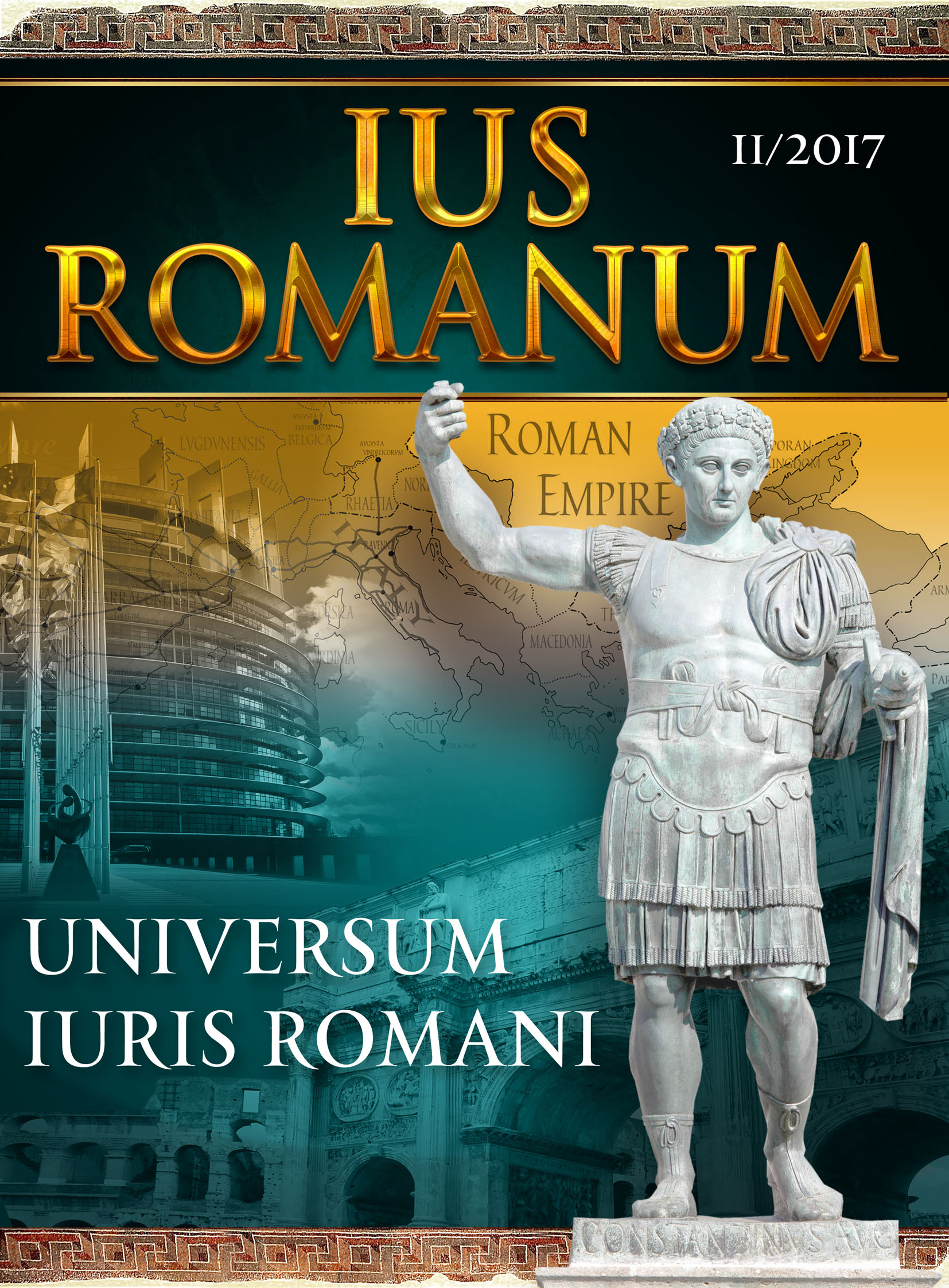IL ‘SISTEMA’ DEL DIRITTO ROMANO COME PATRIMONIO COMUNE DELL’ UMANITA’
ROMAN LAW AS COMMON HERITAGE OF THE HUMANITY
Author(s): Antonio SaccoccioSubject(s): Law, Constitution, Jurisprudence, Civil Law, EU-Legislation
Published by: Софийски университет »Св. Климент Охридски«
Keywords: Roman law; ius commune; ius gentium;
Summary/Abstract: Roman law, beginning from the time of the foundation of the Romanistic juridical system and up to this day, has a clear universal propensity. In the introductory constitutions of the Digest, Emperor Justinian emphasizes that the whole Corpus Juris Civilis represents a true temple of justice, and serves to build almost a city of law, which must be valid forever (in omne aevum). For Justinian it is indispensable to recognize the existence of a common law (ius commune) among all peoples, known or unknown, living in the ecumenical world, in a universalistic perspective, that the modern comparison between the States and the Legal Orders (that from the States derive) make laborious, if not nearly impossible, to grasp. The recognition of the ius gentium from the III century B.C., thanks to the praetor peregrinus, moves exactly in this direction: he creates a sort of ‘supranational consuetudinary right' (Cardilli), with a clear internationalist propensity, which finds its foundation in the naturalis ratio, that roman jurists (see eg Gai. 1.1; or D.41,1,1,1) recognize at its basis. This foundation does not seem to be frustrated by the recognition, some decades later, of the ius naturaleas a self-contained category. But this is a universality that does not have to be understood in a giusnaturalistic sense, but only in the sense of appreciating certain values, that Roman jurists recognize as eternal foundation of good relationships among people: the centrality of the human person; humanitas, fides bona, aequitas, voluntas, libertas, substantial equality; causality in contracts; favor debitoris; the fight against usury, etc. From the combination of all the elements described above, it is already recognized in Rome that there is a common law (ius commune), which is as old as man, precisely because it is based on that naturalis ratio, that jurists recognize as its basis. The ‘iura populi Romani' should therefore be understood as ‘complexes' of juridical norms of the Roman people, but elaborated and re-elaborated in a coherentsystem, in a ‘ius commune romanum', in which the various contributions fit into ‘harmony', upon the basis of the principles that guide them. Undoubtedly, many events have contributed to obscuring the correct view of this event. On the one hand, the closure on itself of the Romanistic thought from the end of the 19th century led to a ‘crisis' of the study of Roman law. On the other hand, the events of the last two centuries, which have led to the conquest of the monopoly of the production of law by the State, have generated a split between the internal order (founded on State's sovereignty) and an international order that (failing to be efficient) dilutes itself in the cross-game of good or bad relationships between absolutely sovereign states. In my opinion, however, it is impossible to cut the umbilical cord that still links modern law to the teaching of Roman jurists. Civil codes do not arise from the mind of the modern legislator, nor from the deference to a hypostatized ‘Grundnorm', abstractly placed. They are, on the contrary, embedded in the system in which they float, as floating islands in the sea: at the basis of them, as well as at the basis of any modern juridical Legal Order, it is easy to recognize the System of Roman law which, despite an inevitable need for a continuous revision, has clearly been the source of many principles of modern, national and international law. This ‘natural Roman law' must be understood as a dynamic and non-static phenomenon: it is a law (ius) that, as jurist Pomponius (D.1,2,2,13) already taught, cannot exist (constare = exist) alone but needs a filter, consisting in daily critical re-processing of what is best for man, which only the jurists can do. In other words, the system based on Roman law (precisely because it is a system that places man and what is best for him constantly in the center, and because it is based on a universally recognized system of values) is an ‘open System', which is not intended to be overcome, but which is constantly renewed and adapted to the multiform and changing reality to which it contingently applies. It can be said that «the universality of Roman law, transmitted to us by the Codification of the VI A.D. by Justinian, ... is to be regarded as a genuine product of Rome and of the Roman people» (S. Riccobono), and must be safeguarded above all by jurists of our as well as of future generations, as a common heritage of humanity. The Romanistic legal system is not imposed, but sought, transposed, and open to dialogue with other legal experiences, to which it offers its own principles. Itsrecovery, its valorisation as a true communicating vessel of values, institutes, principles and norms, is fundamental in order to «uncover any order, any law that does not place man at the center of his scale of values. To retrieve aequitas and humanitas against any barbarity; to build a law that is ever fairer and more humane, so that it can serve man in the depths of our high common legal tradition that shows us how the law can and should be placed at the service of humanity and humanism» (Labruna). These are the challenges the modern jurists must be able to pick up.
Journal: IUS ROMANUM
- Issue Year: 2017
- Issue No: 2
- Page Range: 165-196
- Page Count: 32
- Language: Italian

